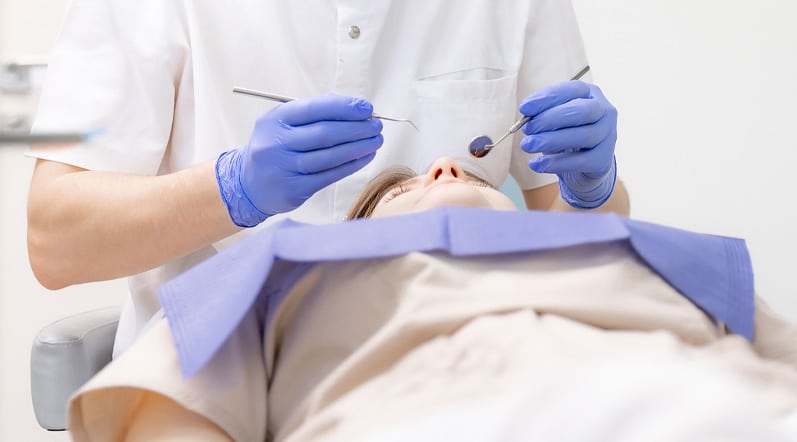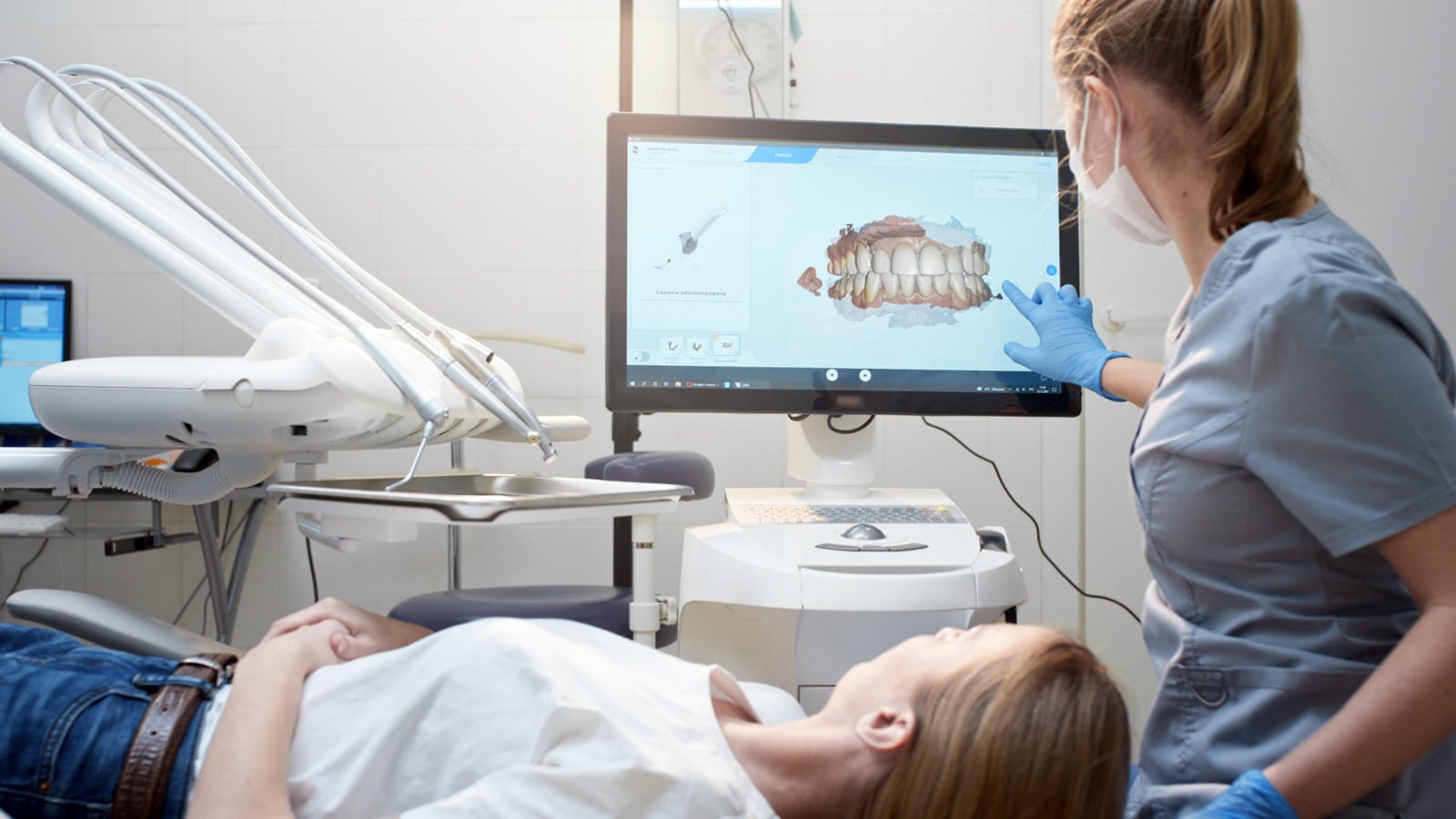Enquire about Emergency Dentistry

What is emergency dentistry?
Emergency dentistry provides urgent care for sudden dental problems that require immediate attention. The goal is to relieve pain, prevent further damage, and restore oral health as quickly as possible. Emergency dental services ensure prompt diagnosis and treatment, helping to save teeth and prevent complications. If you experience a dental emergency, seeking professional help as soon as possible is essential.
Typical dental emergencies include:
Severe toothache
A persistent or intense toothache may indicate decay, infection, or an abscess. Immediate treatment can relieve pain and prevent further complications.
Knocked-out tooth
If a tooth is completely dislodged, acting quickly increases the chances of saving it. Keep the tooth moist and visit a dentist immediately.
Broken or chipped tooth
A cracked or fractured tooth can cause pain and sensitivity. Immediate care prevents further damage and restores the tooth’s structure.
Lost filling or crown
A missing filling or crown leaves the tooth exposed and vulnerable to damage or infection. Prompt treatment is essential.
Dental abscess
A painful swelling caused by infection, an abscess requires urgent care to prevent serious complications, including the spread of infection.
Signs and Symptoms of a Dental Emergency
- Sharp, throbbing, or persistent pain that affects daily activities
- Increased sensitivity to hot or cold temperatures
- Pain when biting or chewing, indicating possible tooth damage or infection
- Facial swelling, jaw stiffness, or swollen gums, which may signal an infection or abscess
- Unusual taste or persistent bad breath, potentially due to an oral infection
- Visible damage, such as cracks, fractures, or exposed nerves
- Numbness in the teeth or gums, which could indicate nerve damage
- Sudden changes in oral health that require immediate attention to prevent complications

When to seek an emergency dental appointment
Knowing when to see an emergency dentist is critical. The need for quick treatment cannot be overstated: it is the only way to prevent complications and ensure timely relief. Dental emergencies can be scary, and it’s essential to recognise the signs that need immediate attention.
If you’re in distress, have had a dental injury, have uncontrolled bleeding, or have another serious dental problem, make an emergency appointment with a dentist. Quick treatment and immediate care can prevent further complications and get you back to normal sooner.
Finding an emergency dentist in Fulham
If you need an emergency dentist in Fulham, act quickly to get the care you need. Look for a dental practice offering same-day emergency appointments. Many clinics provide urgent care for severe pain, broken teeth, or infections.
Check online reviews and call ahead to confirm availability. If you’re unsure where to go, contact a local private dentist for guidance. Seeking prompt treatment can prevent further complications and relieve discomfort effectively.
Fulham Road Dental – dental emergency care in Fulham – SW6
At Fulham Road Dental, we provide expert emergency dental care in Fulham, SW6. offering fast, effective treatment for urgent dental issues. Whether you’re experiencing severe pain, a broken tooth, swelling, or an infection, our experienced team is here to help. We offer same-day emergency appointments to relieve discomfort and prevent further complications.
Our Fulham Road practice is equipped with state-of-the-art technology to ensure the highest level of care. If you need urgent dental care, contact us immediately for professional, high-quality treatment in a calm and modern environment.
Emergency Dental Care in Fulham
At Fulham Road Dental, we provide expert emergency dental care for a wide range of urgent dental issues in Fulham. We offer prompt, same-day treatment to address your concerns and are able to see you in the evening or at the weekend. Our skilled team provides a variety of emergency treatments, including root canal therapy to save infected teeth, tooth extractions for damaged or decayed teeth, and dental fillings to restore cavities.
We also offer treatment for gum infections, splints for dislodged teeth, and cosmetic repairs for chipped or cracked teeth. With our advanced equipment and personalised care, we aim to relieve pain, restore function, and prevent further complications. Contact us for emergency dental assistance in Fulham, SW6.
Preparing for an Emergency Dentist Visit at Fulham Road Dental
When preparing for an emergency dentist visit, it’s important to act quickly. Gather any relevant medical history and list any medications you’re currently taking, as this can help the dentist provide the best care.
If you’ve lost a tooth, try to keep it moist by placing it in milk or saline solution, and bring it with you. For pain management, take an over-the-counter pain reliever if recommended by your dentist. Be ready to explain your symptoms clearly, including the onset of pain or injury.
Contact us ahead of time to confirm availability and ensure a prompt appointment for efficient care and relief.

Emergency Dentist Treatments FAQs
What constitutes a dental emergency?
A dental emergency is any oral health issue that requires immediate attention to alleviate pain, prevent further damage, or save a tooth. Common examples include severe toothaches, especially those caused by infection or decay, knocked-out teeth, and broken or fractured teeth that cause pain or affect function.
Other dental emergencies include bleeding gums, swelling in the mouth or jaw, or a dental abscess, which is an infection that can spread. A lost filling or crown can also be an emergency if it leaves the tooth vulnerable. If you’re unsure whether your situation is an emergency, it’s best to contact your dentist immediately for advice. Prompt treatment can prevent further complications and help save your teeth.
Can I get a dental appointment on the same day for an emergency?
Yes, many dental practices offer same-day emergency appointments for urgent dental issues. If you have what you believe to be a dental emergency, it’s essential to seek treatment as quickly as possible. Many private dental clinics, especially those focused on emergency care, will prioritise urgent cases and fit you into their schedule the same day.
To ensure prompt care, contact our team at Fulham Road Dental immediately, explain your symptoms, and request an emergency appointment. Being prepared with details about your condition will help the dental team assess your needs and determine the best course of action. Quick treatment can help alleviate pain, prevent further damage, and improve your chances of saving the tooth.
Are emergency dental services available outside of normal business hours?
Yes, many dental practices offer emergency dental services outside of normal business hours, including evenings and weekends. This ensures that patients can receive urgent care when unexpected dental problems arise, such as severe tooth pain, accidents, or infections. You are especially likely to find an emergency dentist appointment if you go to a private dental clinic like Fulham Road Dental.
If you experience a dental emergency outside regular hours, it’s essential to contact your dentist’s office, as many have emergency contact numbers or voicemail instructions for urgent cases. In some instances, a dental hospital or urgent care centre may also be available for severe emergencies. Seeking prompt care is crucial to prevent further damage or complications, especially in situations like knocked-out teeth or abscesses.
What should I do if I lose a tooth?
If you lose a tooth, responding quickly will give you the best chance of saving it. First, pick up the tooth by the crown, avoiding touching the root. Rinse it gently with water to remove dirt, but do not scrub it. If possible, try to reposition the tooth back into its socket and hold it in place, or place it in a container of milk or saline solution to keep it moist.
Contact your dentist immediately for emergency care. The sooner you see a dentist, the better the chance of successful re-implantation, ideally within the first 30 to 60 minutes. If you can’t get to a dentist right away, go to the nearest emergency dental clinic or hospital for urgent care.
How can I relieve pain before seeing an emergency dentist?
If you’re experiencing dental pain before you can see an emergency dentist, there are several methods to help relieve discomfort temporarily. Over-the-counter pain relievers like ibuprofen or paracetamol can help reduce pain and swelling, but be sure to follow the dosage instructions.
Applying a cold compress to the outside of your cheek near the painful area can help numb the pain and reduce swelling. For a toothache, you can also try saltwater rinses to clean the area and soothe irritation. Avoid hot or cold food and drinks to prevent further sensitivity. If the pain is from a visible injury or damage, try to keep the area clean and avoid chewing on that side of your mouth.
Is it possible to save a broken tooth?
Yes, in many cases, it’s possible to save a broken tooth. The key to doing so is seeking prompt emergency dental care. The treatment depends on the extent of the break. For minor fractures, a dental bonding or filling can restore the tooth’s shape and function. For more severe breaks, a dental crown may be necessary to protect the tooth and prevent further damage.
If the break has affected the tooth’s nerve, a root canal may be required to save the tooth and eliminate infection. In extreme cases, if the tooth is too damaged, extraction may be the only option. Early intervention is key, so contact Fulham Road Dental immediately if you have a broken tooth to discuss the best treatment for saving it.
How soon should I visit an emergency dentist after a tooth injury?
You should visit an emergency dentist as soon as possible after a tooth injury. The sooner you seek treatment, the better the chances of saving the tooth and preventing complications. For a knocked-out tooth, seeing a dentist within 30 to 60 minutes gives the best chance of successful re-implantation. A chipped, cracked, or broken tooth should be treated on the same day to prevent further damage or infection. If you experience severe pain, swelling, or uncontrolled bleeding, immediate care is essential.
Even if the injury seems minor, hidden damage could worsen over time. Contact us right away for an emergency appointment to assess the injury and receive appropriate treatment to protect your oral health.
Can an emergency dentist help with a tooth abscess or infection?
Yes, an emergency dentist at Fulham Road Dental can treat a tooth abscess or infection, which requires urgent care to prevent serious complications. A tooth abscess is a pus-filled infection caused by bacteria inside the tooth or gum. It causes severe pain, swelling, fever, and can make chewing difficult. If left untreated, the infection can spread to other parts of the body, posing serious health risks.
An emergency dentist will drain the abscess, prescribe antibiotics if necessary, and may perform a root canal to remove the infection while saving the tooth. In severe cases, an extraction may be required. If you suspect an abscess, seek immediate dental care to relieve pain, prevent further infection, and protect your overall health.
Are emergency dental treatments covered by insurance?
Whether emergency dental treatments are covered by insurance depends on your specific policy and provider. Some private dental insurance plans cover urgent treatments like tooth extractions, root canals, and abscess drainage, while others may only cover part of the cost. Routine treatments, such as fillings or crowns, may not be included under emergency coverage.
If you require urgent dental care, it’s best to check with your insurance provider to understand what is covered and whether you need to pay upfront. At Fulham Road Dental, we offer flexible 0% interest payment plans to help with unexpected costs. If you don’t have insurance, contacting the dental clinic in advance can help you understand the treatment fees and payment options available.
Should I go to A&E if I have a dental emergency?
In most cases, A&E is not the best place for a dental emergency, as hospitals usually do not have dentists on staff. However, you should go to A&E if you experience severe facial swelling affecting breathing or swallowing, uncontrolled bleeding, or a serious injury to the jaw. For most other dental emergencies, such as severe toothaches, broken teeth, abscesses, or lost fillings, you should contact an emergency dentist instead.
At Fulham Road Dental, we offer same-day emergency appointments to provide urgent care. If you’re unsure where to go, call your local dental practice for guidance. Seeking prompt dental treatment will help relieve pain, prevent complications, and ensure you receive the most appropriate care for your emergency.
What are the risks of not seeking emergency dental care immediately?
Delaying emergency dental care can lead to serious complications, worsening pain, and long-term damage. Untreated tooth infections can spread to the jaw, face, or even the bloodstream, leading to a potentially life-threatening condition called sepsis. A cracked or broken tooth may worsen, increasing the risk of infection or requiring extraction instead of a simple repair.
Severe toothaches often indicate decay or nerve damage, which, if left untreated, could result in the need for a root canal or tooth loss. Ignoring gum infections or abscesses can lead to bone loss and more extensive treatment. Seeking prompt care helps relieve pain, prevent complications, and protect your oral and overall health.